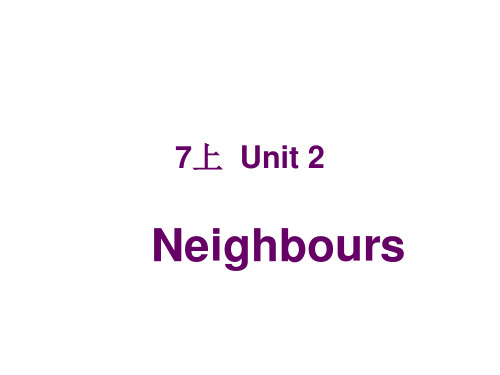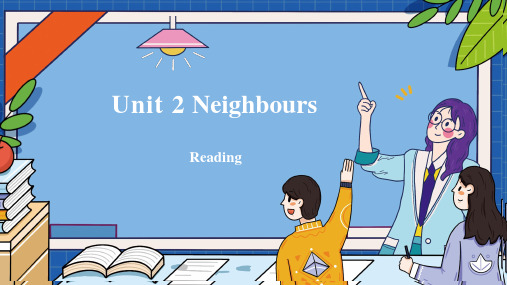牛津译林版英语七年级下册第二单元复习 课件
- 格式:ppt
- 大小:5.05 MB
- 文档页数:89






牛津译林版七年级英语下册29.Sick 与ill 做表语可互换,作定语ill表示坏的,邪恶的Sick 还可表示恶心的,想吐的30.Be busy doing sth./be busy with sth.He is busy cooking in the kitchen.What are you busy with every day?--I’m busy getting ready for my exam.31.Notice n. 布告,通知可数做不可数名词,意为注意,做动词意为注意,通知,注意到I didn’t notice you.Notice sb do sth 注意到某人做某事I noticed him cross the street.rmation 不可数名词,a piece of information 一条信息News,information 是不可数名词,而message,idea,newspaper则是可数名词33.Better adj./adv.I like green better.They will make you feel better.34.A group of 一群,一队in groups 成群,分组We often work in groups.A group of students are helping the old clean the rooms.35.Make sb. SthMake sb. Adj.Make sb. Do sth.36.Worry about sb/sth.Worried adj.担心的,忧虑的be worried about sth/sb=worry about sth/sb.He is worried about his mother.37. Be happy to do sth. 高兴做某事是be+adj.+to do sth.的结构类似单词:be+sad/glad/excited/pleased…+to do sth.We are excited to hear the news.。


Unit 2 单元复习一、单项选择1. –What do you usually do the evening 1st January?–We usually have a party.A. in; onB. in; ofC. on; ofD. on; in2. There is umbrella behind the door. Whose is it?A. aB. anC. theD. /3. –What’s your cousin like?–A. He teaches me English.B. He likes sports.C. He’s lovely and funny.D. He’s a waiter.4. Lily is going to a nurse. She wants to look after people.A. do; illB. do; sickC. be; illD. be; sick5. Why not go to see a film? That a good idea! Let’s go.A. hearsB. listensC. soundsD. sounds like6. There are a lot of clouds in the sky. I think it .A. rainsB. is going to rainC. will rainD. is raining7. Our teachers ask us more books in the free time.A. to readB. readingC. readD. not read8. There a party the day after tomorrow.A. is going to haveB. will haveC. is going to beD. shall be9. The little boy is very clever. He knows WeChat.A. how to useB. how useC. what to useD. what using10. What does the notice , Mary?A. talkB. sayC. speakD. tell11. Can you cook eggs with tomatoes? Yes of course. do it.A. AnyoneB. SomeoneC. AnythingD. Something12. What’s wrong? My bike isn’t .A. workB. goC. workingD. using13. –Dear, go to bed before 9 o’clock.–OK. I , Mum.A. doB. don’tC. willD. won’t14. Peter often makes his sister . What a nice brother!A. feels happyB. feel happyC. feels sadD. feel sad15. Little Wilson is good at drawing. He may become a good some day.A. workerB. artistC. cookD. player二、完形填空My dearest Aunt Chen lives in the country (郊区). But she isn’t a 1 . She 2 vegetables from the farmers and sells (卖) them in town. Sometimes she can’t sell out all her vegetables, 3 she gives some to us. Aunt Chen is old and short, but she’s very 4 . She can walk 5 .Aunt Chen has no 6 . She lives with her only black dog. Every summer, I go to stay with 7 for a week or two. She is very happy and often takes me to a farm nearby. Life in the country is 8 . I can go fishing, and I can hear birds sing and sheep bleat. I can also go to play in the field with 9 children and work with the farmers. The farmers don't do farm work with animals now. They use machines todo it. 10 of them live a modern life.1. A. teacher B. doctor C. farmer D. nurse2. A. grows (种植) B. sells C. asks D. buys3. A. but B. so C. or D. because4. A. healthy B. ill C. happy D. interesting5. A. slowly B. fast C. near D. far6. A. money B. friends C. home D. children7. A. him B. her C. it D. your8. A. unhappy B. boring C. poor D. interesting9. A. another B. any other C. other D. others10. A. Both B. All C. Each D. None三、阅读理解AWelcome to our community centre!We have different clubs. It is a great place to keep fit and enjoy yourselves!1. You can see the information .A. in a comic bookB. on TVC. in a magazineD. on the community notice board2. The word “cool” means “ ” in the sentence “It is really cool!”A. wonderfulB. not hot or warmC. coldD. difficult3. You can take the dancing class at .A. 7:00 a.m.B. 3:00 p.m.C. 4:00 p.m.D. 8:00 a.m.4. Mr. Thomas is free from 6:00 a.m. to 8:00 a.m. and he can go to .A. Ball Games ClubB. Swimming ClubC. Free ClassesD. Kids Club5. Mrs. Thomas wants her 5-year-old girl to learn dancing. She should call .A. 375-4789B. 375-4753C. 375-4676D. 375-4766BDo you live with your grandparents or great-grandparents? Recently, a video called “Four Generations”has become popular online. It shows the structure of a Chinese family from young children to great-grandparents. It also shows how much Chinese people love their family.In many Chinese families, a few generations live together. This is called anextended family. Usually it is “four-two-one”—four grandparents, two grandparents and one child.This family structure has both good and bad sides. When parents are busy with work, grandparents can help take care of the children. According to The Atlantic magazine, 90% of children in Shanghai and 70% of children in Beijing grow up with the care of grandparents.But some people say grandparents love their grandchildren too much and let them eat too much. Arguments may happen among family members of different ages.Life can be both sweet and bitter. Family life is no different. But the most important thing to remember is that family is all about love.6. What is the structure of a Chinese family in the video?A. From young children to parents.B. From young children to grandparents.C. From parents to great grandparents.D. From young children to great grandparents.7. What does the video show?A. How busy Chinese people are.B. How sad Chinese people are.C. How much Chinese people love their children.D. How much Chinese people love their family.8. Who spends the most time staying with children according to The Atlantic?A. Parents.B. Grandparents.C. Great-grandparents.D. Nurses.9. Which of the following is NOT true according to the passage?A. A video called “Four Generations” has become popular online.B. “Four-two-one”—four grandparents, two grandparents and one child.C. This family structure doesn't have any bad sides.D. Life can not always be sweet.10. Which would be the best title for the passage?A. Four Generations.B. Parents and grandparents.C. Different families.D. Love from grandparents.四、填空A)根据括号中所给汉语写出单词,使句子意思完整正确。

七年级英语下册知识点总结Unit 2 Neighbours一、重点词组、句型用法一、重点词组、句型用法1. I am afraid they won`t welcome visitors like you.我恐怕他们不会欢迎向你这样的客人。
我恐怕他们不会欢迎向你这样的客人。
be afraid to do sth 害怕去做某事害怕去做某事 be afraid of sth /doing sth.害怕某物/做某事做某事be afraid+(that)从句welcome sb. 欢迎某人迎某人 welcome to sp.欢迎来到某地欢迎来到某地like (prep)像He, _______his elder brother, likes chatting with others. I’m afraid so.恐怕是的。
恐怕是的。
I’m afraid not. 恐怕不是这样的。
恐怕不是这样的。
2.It`s good to live in a neighbourhood like that. 住在那样一个小区很好。
住在那样一个小区很好。
It`s+形容词to do sth3.What are your neighbours like?= How are you neighbours?你的邻居们(性格品质)如何?你的邻居们(性格品质)如何?What be sb/sth like?你认为…怎么样(性格品质)?(用形容词回答)?(用形容词回答)What do/does sb. like?某人喜欢什么?某人喜欢什么?What do/does sb. look like?某人长什么样子(外貌)?4. They often meet at the community centre and share their different skills.different +名词复数名词复数5.Some of them are volunteers.他们中有一些人是志愿者。






